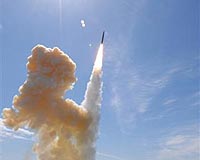| . |  |
. |
Washington (UPI) May 12, 2009 Talks open between the United States and Russia in Moscow on Monday about a new strategic arms reduction treaty to replace the 1991 START-1 treaty, which runs out at the end of this year. But Russian sources have told United Press International that the negotiations to complete START-2 could take a lot longer than that. U.S. President Barack Obama, Secretary of State Hillary Clinton and their policy advisers still see completing START-2 as the cornerstone of restoring a healthy, stable U.S.-Russian relationship. But the generation of Russian policymakers they face in Moscow has a very different view of the U.S.-Russian relationship than their predecessors in the old, late Soviet era did. Far from being eager to reduce tensions in cooperation with the United States, they are convinced that recent U.S. administrations, both Democratic and Republican, have remorselessly advanced the U.S.-led North Atlantic Treaty Organization, first to cover Central Europe and now even to start absorbing former Soviet republics that were part of Russia itself for decades. The Russians also believe that the only area where they can deal with the United States on anything close to parity is in the trading negotiations over nuclear weapons, and Moscow sources said the Kremlin is therefore in no hurry to reach an agreement too soon on the new treaty and that it will insist on a major price for every concession it makes in the talks. The tough, suspicious mood in Moscow was displayed to Obama and his policymakers, and to the rest of the world, in the annual Victory Day celebrations on May 9 commemorating the Soviet Union's triumph over Nazi Germany at the end of World War II. The celebrations this year were characterized by a public display of military might such as Russia and the rest of the world had not seen since the disintegration of the Soviet Union at the end of 1991. Russian President Dmitry Medvedev presented the huge display of force in the Victory Day parade to the Russian people as essential to protect the nation from aggressive military threats against it. "The victory over fascism is a great example and a great lesson for all people and is still current today when people are again starting military adventures," he said, according to a report carried by the RIA Novosti news agency. "We are sure that any aggression against our citizens will be given a worthy reply." Medvedev's tough talk came only nine days before the first round of talks on the new strategic arms reduction treaty were scheduled to begin. They are due to last for three days from May 18 to 20. But they also came as tensions between Russia and the United States, along with its NATO allies, are rising ominously again. President Obama and NATO leaders are pushing ahead with major military exercises in the former Soviet republic of Georgia in the Caucasus. The Russian army conquered one-third of Georgia in a five-day blitzkrieg operation last August but failed to topple its fiercely anti-Russian and pro-American President Mikheil Saakashvili. In recent weeks, Russia has alarmed U.S. and European leaders by greatly increasing its military forces in the two Georgian secessionist enclaves of South Ossetia and Abkhazia. The nuclear-treaty talks, therefore, will start with several dark shadows hanging over them. Excessive confidence as to their quick, successful outcome would therefore appear to be misplaced. Share This Article With Planet Earth
Related Links Learn about missile defense at SpaceWar.com Learn about nuclear weapons doctrine and defense at SpaceWar.com All about missiles at SpaceWar.com Learn about the Superpowers of the 21st Century at SpaceWar.com
 Russia Talks Tough About Future Nuclear Doctrine Part One
Russia Talks Tough About Future Nuclear Doctrine Part OneWashington (UPI) May 11, 2009 Russian leader Vladimir Putin warned Sunday that he would never agree to a new strategic arms reduction treaty with the United States until U.S. President Barack Obama agreed to scrap plans to deploy 10 ballistic missile interceptors in Poland. The plan, originally developed by the Bush administration, is intended to protect the United States and Western Europe from the threat of Irania ... read more |
|
| The content herein, unless otherwise known to be public domain, are Copyright 1995-2009 - SpaceDaily. AFP and UPI Wire Stories are copyright Agence France-Presse and United Press International. ESA Portal Reports are copyright European Space Agency. All NASA sourced material is public domain. Additional copyrights may apply in whole or part to other bona fide parties. Advertising does not imply endorsement,agreement or approval of any opinions, statements or information provided by SpaceDaily on any Web page published or hosted by SpaceDaily. Privacy Statement |